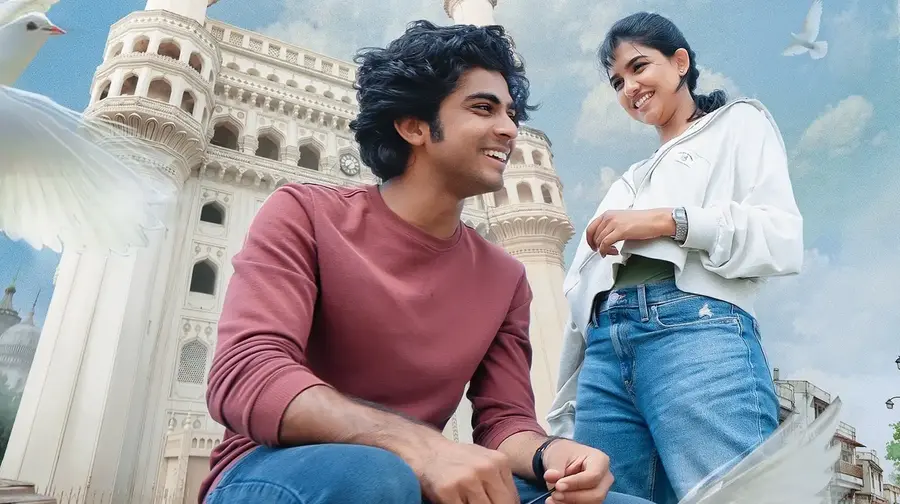The genre is typically filled with big, larger-than-life romantic moments, but Premalu is filled with hilariously down-to-earth, “practical” things like… well, the very understandable call to Anjali instead of Anjaneyan. You can say this of his earlier films, too: Thanneer Mathan Dinangal and Super Sharanya. They can all be lumped under the genre I like to call “coming-of-age as seen through the prism of a rom-com”. But there is a gradual progression of the milieu. Girish’s first film was about school dinangal, the second one was about college days, and Premalu is about Sachin and Reenu, who have just graduated and are finding themselves away from home, pursuing an IT job (in her case) and higher education in the UK (in his case). The utterly charming Naslen K Gafoor and Mamitha Baiju play Sachin and Reenu in a way that erases the lines between actor and character. Had this casting not worked, the film might have fallen apart.
Because Premalu, unlike other stories about love, is not about mutual chemistry but about individual idiosyncrasies. We are kept on our toes, trying to “read” these characters. One of the best aspects of the superb script – by Girish and Kiran Josey – is trying to figure out at what point Reenu begins to harbour feelings for Sachin. Is it the fact that his amiable “loser-dom” is such a contrast to the hyper-achieving alpha-ness of her collegue Aadhi? Is it the strange things that Sachin does, like getting her Ayurvedic medicines? Is it the fact that he is so chilled out that he doesn’t even have a usable résumé? Is it that she likes taking care of this man-child? Is it due to the emptiness created in her life when her roommate and close friend moves to another city? Is it the realisation that she might have inadvertently led Sachin on, through her actions? There is no single answer, and that is the beauty of the writing. In Sachin’s case, it’s always love at first sight. He is a simple guy who studied in a State-board school and speaks only Malayalam, and perhaps this is what the movies have taught him.

But for Reenu, love is a more “calculated” affair. It involves conditions like “the man must be mature”. She is English-educated, and she lives in a posh flat as opposed to Sachin’s cramped quarters. Sachin shares this space with his friend Amal Davis: note that the man’s initials (AD) are the same as the director’s. Coincidence? Or did Girish want to leave his stamp on the film’s most memorable character. Sangeeth Prathap is outrageously funny and enormously likeable as Amal Davis, and some of us will be left wishing for a movie written entirely around Sachin and Amal. So how do you describe the writing? Why is it so special, so original? Let’s look at the stretch that begins when Sachin is caught sleeping in a GATE coaching class. The way I have described this scene, it is a cliché. A loser-guy dozing off in class: what’s new, right? But the way the teacher’s character is shaped in the scene just afterwards, we are surprised. And see how one thing leads to another. The teacher invites Sachin and Amal to his wedding, which introduces a new character – a crazy car – to the mix, and the wedding is where Sachin meets Reenu. How many boy-meets-girl scenarios have we seen! And yet, how crazily unique this one is! Or consider the bit where Sachin says he does not know how to behave in an AC compartment of a train! What could have been a Big Point about class is transformed into the sweetest of comic situations.
In fact, when you dig deep (and despite the buoyant songs by Vishnu Vijay), there is so much dysfunction. Nothing is going right with Sachin’s life. His parents are always fighting. He is not getting that UK visa he wants so badly. His love life is a disaster. His money situation is a disaster. Even his underwear are filled with holes. As for Reenu, the confidence and independence she projects is at odds with what she seems to want, to be taken care of by a mature man. And from this material, Girish mines the loudest of laughs. I doubt I have cracked up so much at the mention of “CBSE” or “stalking”. A couple of gags involving guest star Mathew Thomas don’t work (the oddly one-note character gets no room to breathe), but almost everything else does: the telescope joke, the bit with the statue, Sachin and Amal’s reaction shots during a Radha-Krishna dance, the Yuvan Shankar Raja reference, or the part where Reenu’s colleague Aadhi takes prison-type pictures of Sachin and Amal. Aadhi’s character is another standout. The control-freak/toxic man is written like a live-action cartoon (he even gets his own “cartoon music”), and Shyam Mohan captures that vibe perfectly.



